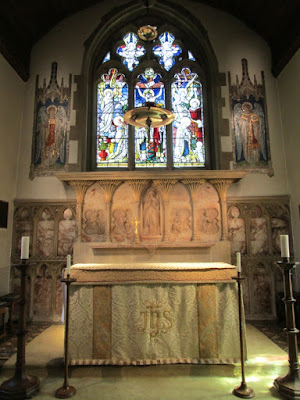Six years ago I wrote a series of posts about the resemblances between the unconventional Christian healing ministry of Agnes Sanford and the occult practice of Dion Fortune - possibly something it is quite improper for me to take an interest in, but it does raise intriguing questions about orthodox Christianity. I'm thinking around this area again as I may be doing another Goth Walk, as I have long, long promised, about the 'occult societies of Victorian London'. To be honest, there's only one, the Golden Dawn, unless you count the GD's various offshoots and splinters. You can find shadowy references to other stuff around the same time, but nothing very definite.In the course of this I read Sword of Wisdom by Ithell Colquhoun, a mid-twentieth-century Surrealist artist who was a fierce partisan of Samuel and Moina Mathers, the 'Supreme Magus' of the Golden Dawn and his redoubtable wife. Colquhoun never met either of them, only joining the Alpha et Omega - the society composed of Mathers loyalists left after the Golden Dawn's great disruption at the turn of the century - in 1928 when it was run by Isabel Morgan Boyd, Moina Mathers's decreed successor; at that time she was a student at the Slade School of Art, where Moina had been enrolled nearly fifty years before. It's clear how Colquhoun identified with them both. In her book, published in 1975, she's scathing in differing degrees about those who left the true fold and proved disloyal to her idols even where, as with WB Yeats, Aleister Crowley and Dion Fortune, she recognises their abilities. They have cut themselves off from the true stream of hidden truth, she avers, and there lies an interesting parallel with the world I normally move in.
Now, central to the idea of the Golden Dawn were the Secret Chiefs. It was unclear who they were supposed to be; Mathers came to believe that they were 'human and living on this earth, but possessing terrible superhuman powers'. In its early years the Golden Dawn used a series of rituals and symbolism derived from the 'Cipher Manuscripts' which had come into the hands of one of the founders, William Wynn Westcott, and which Mathers had translated; they had contained the address of an obscure German occultist, one Fraulein Sprengel, who, when contacted by Westcott, communicated to the British esotericists the instructions of the Secret Chiefs, whoever they were. But Sprengel apparently died in 1890 and two years later Mathers announced that he had made contact with the Chiefs himself, marking a shift in the Order's emphasis towards practical magic, astral projection, clairvoyance, and that sort of thing. As the Golden Dawn fell apart around 1900 Mathers alleged that Westcott had made it all up, to the horror of the membership, but far from feeling that this undermined his own authority in any way he clearly felt he was vindicated by his separate contact with the occult powers that were directing him.
Did Mathers believe all this? I hadn't read his 'Manifesto' until a couple of days ago, issued to all members of the Second Order of the GD in the 1890s; in this he states that the Chiefs communicated all the rituals of the Order by clairvoyance, divination, and occasionally audible voices which both he and Moina heard. It reads like the work of someone who is capable of being deluded by his own enthusiasm, but not necessary an obvious fake or nutcase, so perhaps he did. Some GD enthusiasts are content to point to the practical usefulness of the Order's techniques and argue that whether it actually came from some outer force or just from Mathers's fertile imagination doesn't matter. Ithell Colquhoun disagrees, arguing that Mathers was the Chiefs' chosen leader and nobody could break with him without also cutting themselves off from the true source of magical power:
You cannot lightly reject their choice ... Once made it cannot be switched to some other Conductor by human caprice.
The key question, Colquhoun insists, is whether you accept the reality of the Secret Chiefs. If they are genuine, if they exist in any commonly-accepted sense as beings with wills and initiative, then
dissidents are without sanction from the initiatic chain and will suffer, sooner or later, from psychic aetiolation.
You can see what's going on here: it's an occultist's version of the Apostolic Succession. Dissident occult societies are to the Golden Dawn what Protestant denominations are to the Catholic Church: they may do worthwhile and interesting things but essentially they are sundered from the divine electricity which keeps things going and will, ultimately, wither. Now, this is a caricature of Apostolic Succession, but I was intrigued to see the same idea cropping up in this context.
Christian origins, too, are, as we know, nothing if not mysterious and the exact mix of reality and distortion can be argued about infinitely by Biblical and other scholars. Apostolic Succession is a way of getting around the uncertainty, but as Fr Couratin said once, it's less a matter of 'hands on heads than of bums on thrones' - that is, what matters is not the technical details of the consecration of one bishop by another in an unbroken sequence back to the apostles, but the role of the bishops in formulating the communities of believers in which the truth of the Gospel is settled, explored and meditated on. In occult terms, if the angels will forgive the analogy, we are more with Dion Fortune than with Ithell Colquhoun.






























